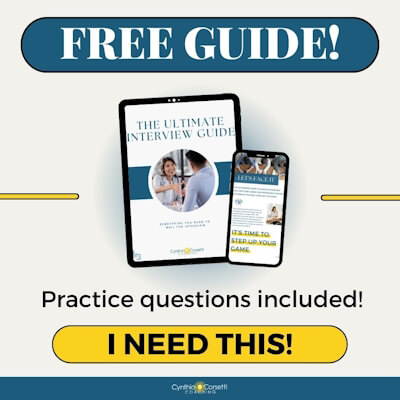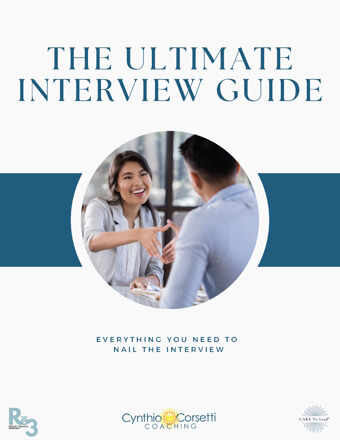A job interview is a snapshot in time. It’s a brief picture of who you are and what kind of candidate you’ll be. And you only have a split second to make the picture memorable. Sometimes there are things about your past job history you’d rather not talk about that lead to those tricky job interview questions.
But they will come up in your interview. And those hard interview questions can trip you up. But they don’t have to. Today, let’s talk about three tough interview questions and how to answer them. These are situations that can make even the best candidates choke..
Ready?
Situation 1: You were fired for cause
That’s always hard! But it doesn’t have to be. Remember, millions of people are fired each year, and they all get new jobs. This isn’t the end of your career.
Losing your job is nothing more than a snapshot in time. It’s a professional challenge you were strong enough to overcome. That’s actually a plus to a potential employer.
So step back and take a hard look at what happened. Are you holding a grudge? If you are, I get it. You can still feel the sting of that slap.
But even if you don’t act like you’re holding a grudge, I promise you a skilled interviewer will sense it. Try taking some time to reflect (objectively) on what happened.
Ask yourself if you were working at your highest potential. Go through the circumstances in your mind. What could you have done better? What would you do next time that would be different?
And then, (this is important) FORGIVE yourself. You’re human. We all screw up. Continuing to beat yourself up over it will only serve to slow your comeback.
I promise you’ll make more mistakes in the future. Each one will make you a stronger professional.
But what if you look at it from an objective viewpoint and you still believe you did nothing wrong? Accept that. Accept the fact some things are out of our control. And unless it was an illegal firing, move on.
Whatever happened is over. Chances are you see a side of the company you didn’t see before. Count your blessings you’re out of there and move forward.
Letting go of the anger on this is hard. But that anger will show up in an interview. Your body language will show it even if your words don’t.
Before the interview do what you need to do to come to terms with it. Meditate. Take a yoga class. Listen to music. Do what you need to do to find your zen.
And then face your interviewer. You know the question will come up. “Why did you leave your last position?” Instead of letting anger, hurt and fear take over, breathe and focus on your answer.
I understand It’s hard to know what to say, but relax. It’s going to be okay. Own it. Whatever it was, just own it. You might say, “actually, that was a huge career learning experience for me. I was let go because I made a mistake. I respect the decision, and I will NEVER make that mistake again”.
Don’t go into extreme detail about the mistake, but you can elaborate on what you learned. It shows you aren’t bitter, and you’re not slamming the company.
And, mostly, It shows you learned from it! The key is to believe what you’re saying. So take time before the interview to reflect on it and land on an answer you believe.
Situation 2: What are your salary requirements?
When it comes to tricky job interview questions, this is always a tough one. We don’t want to sell ourselves short, and we don’t want to price ourselves out of the running.
First, let’s think about why you’re interested in this particular position. Is it a position or two above your current role? Or is it a role that will open you up to connections that will help your future?
Is it a company you’ve always wanted to work for? Or the perfect commute?
Those reasons should factor into your answer to the question. If you’re applying for a new job, and money is the primary reason, keep that in mind when you answer. (Although money itself shouldn’t be your primary reason, but that’s another story).
One way to handle this question is to say, ‘my current salary is xxx and I’m hoping for a non-lateral move.’
That is an honest answer without shooting yourself in the foot. It means you might be willing to make a lateral move. But you prefer to move up. They’ll take that into consideration when deciding on an offer for you.
You can walk out of the interview feeling you set yourself up for success. Because isn’t it a horrible feeling when you walk out wondering if you could have asked for more?
Situation 3: Explaining huge gaps in the resume
Again, I say own it.
I had a client once whose dad was terminally ill. He was given about 3 months to live. This client was very close to his father and getting a leave from his job wasn’t possible.
So he made the difficult choice to resign. He thought he would spend those last few months with his father and then jump back into work.
Only… his father didn’t die. First it was three months. Then six. Then twelve.
Before he knew it, three years had passed and he realized his career had been on a back burner for way too long. This was going to be a huge challenge at an interview.
Each time the question came up, he would get nervous. He would over explain. After about four interviews, he reached out for help.
This was tough. We had to work through several options to find one that put him at ease when the question came up. And we chose to do it with a bit of humor.
In his next interview, when they asked, what have you been doing for the last three years? He said, “Honestly, I was waiting for my dad to die, and that man is way stronger than the doctors gave him credit for”.
He then said, his dad is still healthy today, and went into the explanation in an honest and vulnerable way. This made him relatable. And he got the job.
A lot of folks have gaps in their resume. Get comfortable with your answer. Practice it. And own it.
If you stayed home to raise kids, own that. And talk about how you did volunteer work or served on committees during that time. Maybe you took some online courses.
No matter the reason that there’s a gap, tell the truth. And always try to turn it into a positive.
Preparing for tricky job interview questions
Have confidence in your next interview. You have so much to offer, and the employer that hires you will benefit from your knowledge!
To better prepare yourself in the lead up to those tricky job interview questions, download the free Job Search Action Plan. It will jump start your progress and streamline your results. Learn to:
- perfect your resume, cover letter and thank you note,
- pay attention to your personal branding
- Stay organized during your search
- Use job boards effectively
- And complete a profile checklist

You’ve got this!
Cynthia Corsetti is an Executive and Career Coach. Whether you’re looking for a career transition or to make a bigger impact in your current career, Cynthia is the partner you’re looking for. Follow her on Facebook, LinkedIn, and YouTube. For help specifically with mastering interview skills, book an Interview Mastery session.
PHOTO CREDIT @o_O𝓴𝓮𝓻𝓼𝓽𝔂𝓷O_o











0 Comments